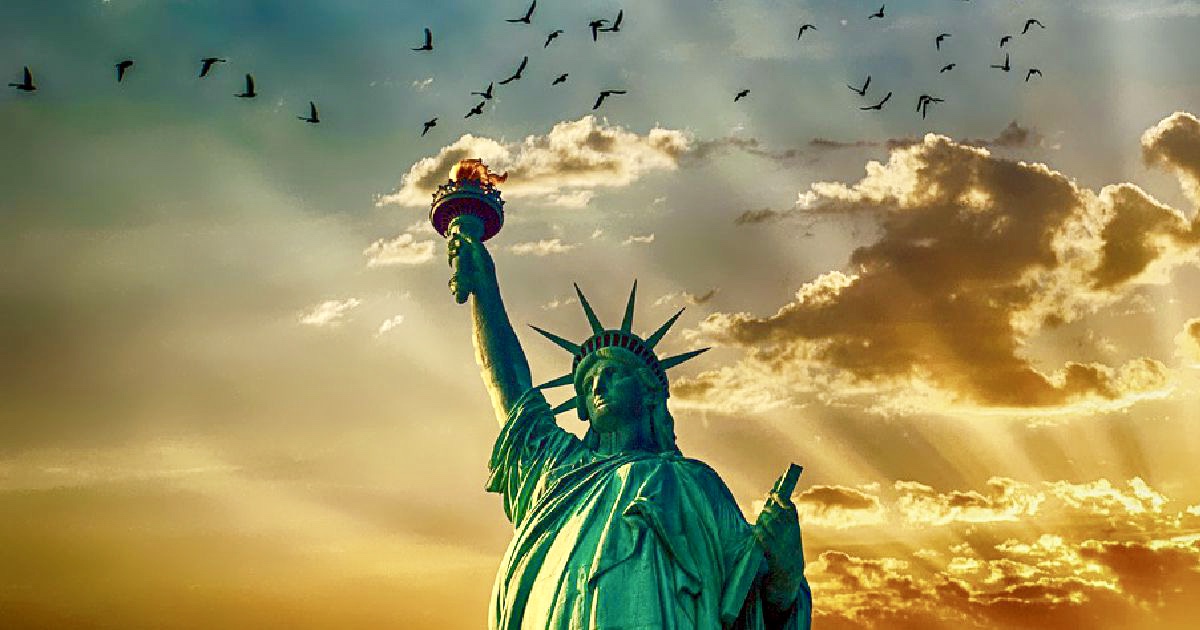We are learning that the Declaration of Independence and the Constitution are not enough to maintain liberty. Freedom is maintained when a critical mass of the public acts in adherence to the timeless principles of individual liberty bequeathed to us.
The words in the Constitution, explains Eric Metaxas in his book If You Can Keep It: The Forgotten Promise of American Liberty, “are merely deaf, dumb, and mute shapes of inert black ink.” “We the people,” not politicians, were intended to be “the keepers of the flame of liberty.”
In a 1787 letter, Ben Franklin wrote,
Only a virtuous people are capable of freedom. As nations become more corrupt and vicious, they have more need of masters.
Other Founders felt the same way. Madison warned:
Is there no virtue among us? If there be not, we are in a wretched situation. No theoretical checks, no form of government, can render us secure. To suppose that any form of government will secure liberty or happiness without any virtue in the people, is a chimerical idea.
America Is an Idea
“For the first time,” writes Metaxas, “a nation was created that was not merely a group of ethnically or tribally similar people. Nor was it a nation composed of disparate groups held together by a strong leader.”
Nor did the Founders bequeath us a nation where the majority subjugated others under the pretense of democratic voting. Instead, our government was to be one with few and defined powers whose primary function was to protect inalienable rights.
The Core American Virtue Is Vanishing
Virtue begins when we want the same freedom for others that we want for ourselves. If we love liberty, we “have a conviction that each individual is created equal to all others and that he has the same unalienable rights to life, liberty, and the pursuit of happiness.”
There is a growing conviction in America that only some have the right to free speech and not all have the right to be free from violence.
On college campuses, a recent survey shows that 46 percent believe First Amendment rights to free speech are outranked by “efforts to promote and enforce an inclusive society.”
No doubt, these students see themselves as more virtuous than others, yet their convictions are a threat to freedom. They do not understand that their right to free speech is only as strong as their support of the rights of others to free speech. Today they curtail the free speech of others, and tomorrow nothing will stop government from their rights.
Recently there was Antifa’s attack on Andy Ngo, “a freelance journalist often associated with the pro-free thought cultural publication Quillette.” In Portland, Oregon, “Antifa fighters beat up and milkshaked Ngo, apparently because he was there and he was not on their side.”
Then there was the incident where an employee of an upscale bar spat on Eric Trump, the president’s son.
We are free to intellectually reject for ourselves the liberty we have inherited, but we are not free to establish what our inheritance is. “To Jefferson,” writes Jon Meacham in his book American Gospel: God, the Founding Fathers, and the Making of a Nation, “the ‘Creator’ invested the individual with rights no human power should ever take away.”
The Importance of Cherishing Freedom
Americans in the Revolutionary era, Metaxas tells us, “were well practiced in living with those who held different beliefs from their own.”
Meacham writes,
What separated us from the Old World was the idea that books, education, and the liberty to think and worship as we wished would create virtuous citizens who cherished and defended reason, faith, and freedom.
About unbridled passions, John Adams would say, I told you so.
We have no government armed with power capable of contending with human passions unbridled by morality and religion. Avarice, ambition, revenge or gallantry would break the strongest cords of our Constitution as a whale goes through a net. Our Constitution is designed only for a moral and religious people. It is wholly inadequate for any other.
Do we need a remedial course in cherishing and defending freedom?
Virtue Begins with Humility
The Founders believed in God and religion as a basis for morality, yet they saw there were other pathways to a moral life. Meacham writes:
Part of the genius of the Founding was the creation of a culture in which men and women of goodwill—whatever the wellspring of that goodwill, be it a fear of God or a secular moral framework—could live together and prosper together.
They saw themselves as an “infinitesimal part” of a Whole they could never fully comprehend. John Adams said:
I hate polemical politics and polemical divinity. My religion is founded on the love of God and my neighbor; on the hope of pardon for my offenses; upon contrition; upon the duty as well as the necessity of [enduring] with patience the inevitable evils of life; in the duty of doing no wrong, but all the good I can, to the creation of which I am but an infinitesimal part.
Jefferson, writes Meacham, “cautioned against reflexively assuming a cause-and-effect connection between religious belief and moral conduct.”
On the dogmas of religion, as distinguished from moral principles, all mankind, from the beginning of the world to this day, have been quarreling, fighting, burning and torturing one another, for abstractions unintelligible to themselves and to all others, and absolutely beyond the comprehension of the human mind.
Being Lovely
In my FEE essay, “What Adam Smith Can Teach Us about Being Lovely,” I wrote:
Lovely is the term Adam Smith uses in his book The Theory of Moral Sentiments to describe individuals who are “worthy of being loved” because of their character.
In How Adam Smith Can Change Your Life, economist Russell Roberts builds on Smith’s The Theory of Moral Sentiment. Roberts describes the role “each of us plays in creating a moral society.” As we live our lives, we are “creating our civilization.”
I added, “Individually, we decide what is virtuous. Collectively, as we act on our decisions, we determine the societal culture in which we live.”
If intolerance toward others different from ourselves increases, freedom will continue to vanish. If politicians work to restrict commerce and confiscate wealth from others, freedom will continue to vanish. If crony capitalists continue to demand subsidies, freedom will continue to vanish. If colleges continue to eliminate the study of the core values of American and Western civilization from their curriculums, freedom will continue to vanish.
As for those who say America was never virtuous, Larry Reed, president emeritus of FEE, has the perfect analogy.
Imagine if we could bring the Wright Brothers back to life for an hour so the critic could berate them. He would say, “You dummies! You two made this rickety flying machine and didn’t even install seat belts and tray tables, let alone in-flight movies. What good were you?!”
Do we want to justify our lack of virtue by pointing to the lack of perfect virtue in others?
Metaxas asks this question:
If America was indeed a country created not because of ethnic or tribal boundaries but instead because a people had come to believe—and therefore embody—a set of ideas, how could America be said to exist if almost no one anymore knew what those ideas were?
Our future depends on our answer.

Barry Brownstein
Barry Brownstein is professor emeritus of economics and leadership at the University of Baltimore. He is the author of The Inner-Work of Leadership. To receive Barry’s essays subscribe at Mindset Shifts.
This article was originally published on FEE.org. Read the original article.





2 comments
… [Trackback]
[…] Read More on to that Topic: thelibertarianrepublic.com/why-it-must-be-the-people-who-preserve-the-flame-of-liberty/ […]
… [Trackback]
[…] There you can find 34088 more Info to that Topic: thelibertarianrepublic.com/why-it-must-be-the-people-who-preserve-the-flame-of-liberty/ […]